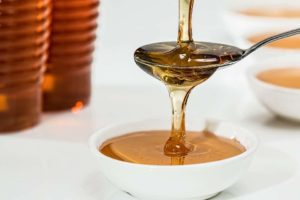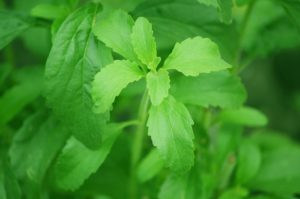One of the hottest health topics today is the demonization of refined sugar—and for good reason. It’s fatally destructive to your body, and it’s even more addictive than cocaine. (In this article I want to focus on healthy alternatives to refined sugar, but if you want to learn how this modern curse has disabled and destroyed people from every corner of civilization, I highly recommend checking out the classic book Sugar Blues by William Dufty.)
So what are we dessert lovers to do? I, for one, am not ready to part ways with my precious sweets. They make my life, well, sweet. However, I love my body too much to harm it in the name of yumminess. I don’t side with the argument that if I die young because of what I eat, at least I’ll die happy. Nor do I want to eliminate all sweets from my life to ensure my vitality. Thankfully, there’s a happy medium!
Not All Sugars Are Created Equal
Let’s talk about refined sugar. Although it originates from plants such as sugar beets and sugar cane, refined sugar is not a natural, whole food. It’s heavily heated and processed into the toxic, addictive substance that causes us so many health problems. That’s why even raw cane sugar is not a healthy option. It just happens to be free of the added bleach we find in white sugar. And let’s not forget refined sugar’s evil sidekick, high fructose corn syrup, which is just as harmful.
Now let’s talk about good sugars. (Yes, they exist!) Fruit is one of nature’s most nutrient dense foods. While fruit contains natural sugar, its water and fiber content slow digestion and fill you up. This helps you avoid blood sugar spikes and other calamities caused by table sugar. Think about how many pears you can consume at once. Usually just one pear is enough to leave me satisfied. On the other hand, eating one cookie simply leaves me with the desire to eat more cookies!
When you eat fruit in the whole form and balance it with the other healthy food groups, you can consume it guilt free. But be warned, fruit juice is not so harmless. Not only is it processed and pasteurized, but it’s also been depleted of all of its fiber and much of its nutrients, leaving behind a high concentration of sugar. So avoid it unless you freshly juice it right in your kitchen, and don’t let labels proclaiming “100% fruit juice” fool you into thinking you’re “drinking” your fruit! For more in-depth information about juice and sources of healthy sweeteners, check out Stephanie Selene Anderson’s handy guide to healthy food shopping Put Your Money Where Your Mouth Is!
Fruit for Dessert
Our bodies crave what we really need. Unfortunately, we can develop unhealthy habits and addictions that also give us cravings. That’s why we need to interpret the source of our cravings. Many times when I hanker for a pastry, I’ll eat an apple instead, and it does the trick! My body wants something sweet, but my brain translates that into a craving for the alluring junk food of today. Of course, my body knows better. Rather than a doughnut hangover, the apple leaves me with a burst of energy.
But what about when a nice fruit basket just doesn’t excite the birthday girl? Special occasions call for legit desserts we can sink our teeth into! Fret not. Fortunately, nature provides us with many nutritious and delicious sweeteners that still taste amazing! Swap refined sugar in your recipes with any of the following healthier alternatives.
Honey
Winnie the Pooh certainly knew the value of this golden nectar, and so do I! Thank the bees for this sweet, syrupy, and extremely nutritious treat. Honey is loaded with antioxidants and flavonoids, which boost the immune system and even ward off cancer. It’s also antiviral and antifungal. 
Eat your medicine: If the changing seasons make you sniffle and tear up (and not because you’re sentimental), you can put those tissues away. Why? Because honey staves off allergies! Since honey is derived from pollen, locally sourced honey will help you build up your immunities against native plants that can cause flare-ups.
Forget the spoonful of sugar that Mary Poppins sang about. Honey, not sugar, is the best way to make the medicine go down! According to a study published in the journal Pediatrics, two teaspoons of honey at night will help alleviate your cold-induced cough. Hooray for a “cough syrup” we can stomach!
How to use it: My favorite thing about cooking with honey is its thick consistency. No need for corn syrup! It also works well in baked goods in place of sugar. Additionally, it dissolves nicely in hot drinks like herbal tea.
To get the most bang for your buck—and optimal nutritional—seek out raw, local, and unheated honey.
Maple Syrup
You can do so much more with this tasty sweetener than just drizzle it over your pancakes. Use maple syrup to replace sugar in any recipe. But let me clarify that I’m not talking about the maple-flavored corn syrups lining the breakfast aisle at the grocery store. I’m referring to 100 percent pure maple syrup, right from the tree. And the darker the grade, the better.
Even though real maple does undergo a heating process—which we know kills a lot of its nutritional value—it still makes the cut thanks to the valuable minerals (iron, zinc, calcium, and potassium, plus antioxidants) that remain.
How to use it: Maple syrup is my favorite replacement for brown sugar. It has a similar rich, deep flavor. It mixes well in dessert sauces and puddings. The maple flavor usually doesn’t overwhelm the other ingredients in a recipe, so it won’t alter the taste of your dish.
Coconut Nectar
Coconuts have become the new celebrity of healthy foods. First there was coconut oil and coconut water, and now these tropical plants have also brought us a sweetener. I was pleasantly surprised to discover this product, which doesn’t taste at all like coconut. It’s a dark syrup, thinner than maple, with a rich flavor that’s similar to molasses, if a bit more mild.
Coconut nectar is high in amino acids and trace minerals, and it contains live enzymes that make it a great aid for digestion.
How to use it: Coconut nectar is thinner than honey and maple syrup, so it dissolves much more easily in cold or liquid desserts. Although it doesn’t taste like coconut, it does have a distinct flavor. You’ll want to play around with it and decide how you like to use it.
Stevia
This one takes the cake for guilt-free sweeteners! (No pun intended). It’s uniquely the only healthy sweetener with zero calories. And unlike artificial zero ca lorie sweeteners, stevia is completely natural and safe to consume. Derived from an herb, it comes in either a green or white powder and amazingly doesn’t contain sugar at all! The green powder is the whole form, so I recommend it whenever possible. If you buy the white powder, read the labels. Some brands add processed sweeteners, such as dextrose, erythritol, and agave inulin, to stevia. For more details on the health benefits of stevia and how to select the most wholesome versions, read Maria Atwood’s recent blog post “Why I Switched to Stevia.”
lorie sweeteners, stevia is completely natural and safe to consume. Derived from an herb, it comes in either a green or white powder and amazingly doesn’t contain sugar at all! The green powder is the whole form, so I recommend it whenever possible. If you buy the white powder, read the labels. Some brands add processed sweeteners, such as dextrose, erythritol, and agave inulin, to stevia. For more details on the health benefits of stevia and how to select the most wholesome versions, read Maria Atwood’s recent blog post “Why I Switched to Stevia.”
Even though stevia is said to be up to 200 times sweeter than sugar, it’s known for a bitter aftertaste. But I can assure you it’s definitely an acquired taste, and the bitterness will go away. It used to be that I could hardly stomach stevia, but now it’s my favorite sweetener! So don’t give up on it too quickly. Also, try the various brands because they have different tastes. You may like some over others.
How to use it: I love stevia in drinks like herbal tea, protein shakes, and hot cocoa. I’ll often use it as the main sweetener in foods since it has zero calories and isn’t a sugar, and then I’ll add one of the more tasty sweeteners. For example, I put stevia in my oatmeal and add just a little maple syrup as a topping.
What About Agave?
Wondering why agave isn’t on the list? When agave first hit the market, it was touted as the healthiest natural sweetener since it’s low on the glycemic index. However, more recent research on this product has caused even Dr. Oz to ban it. Agave has a higher fructose content than any other food. Excessive amounts of fructose cause a myriad of issues, including liver problems and obesity. Nor does it contain the nutrients discussed in our other healthy sweeteners.
Don’t Overdo It!
Other than stevia, these healthier sweeteners still contain sugar. You should treat them as an occasional treat and not a daily staple. The American Heart Association recommends that adults limit their daily sugar intake to 6–9 teaspoons. This doesn’t include sugar from whole fruit, but it does include our lovely sugar alternatives listed here. So eat your treats sparingly, and make them worth your while!
Something to Think About
Be wary of sneaky sugar sources. Even a healthier item like whole grain organic granola can often contain around 15 grams of sugar (4 teaspoons) per ¾ cup serving. Most of us can easily consume twice that amount, which adds up to 8 teaspoons of sugar before you’ve even poured in the milk (and all that sugar hiding in your milk)! So you’ve blown your daily sugar allowance by breakfast, and you haven’t even gotten to dessert!
You can find many products with little-to-no added sugars, so read the labels! Better yet, take the most simple and direct path to controlling your sugar intake: make your food from scratch. Why not have a hot bowl of oatmeal or a green smoothie for breakfast? That way you can save your sugar allowance for a delicious homemade treat later on.
Food is meant to be enjoyed. But like most pleasurable things, we can also abuse it, and it can be abusive to us in return. So eat with intention and take advantage of the wonderful world of real, natural, delectable food that tastes amazing and helps you live a longer, healthier life!
Photo from iStock/zlikovec


